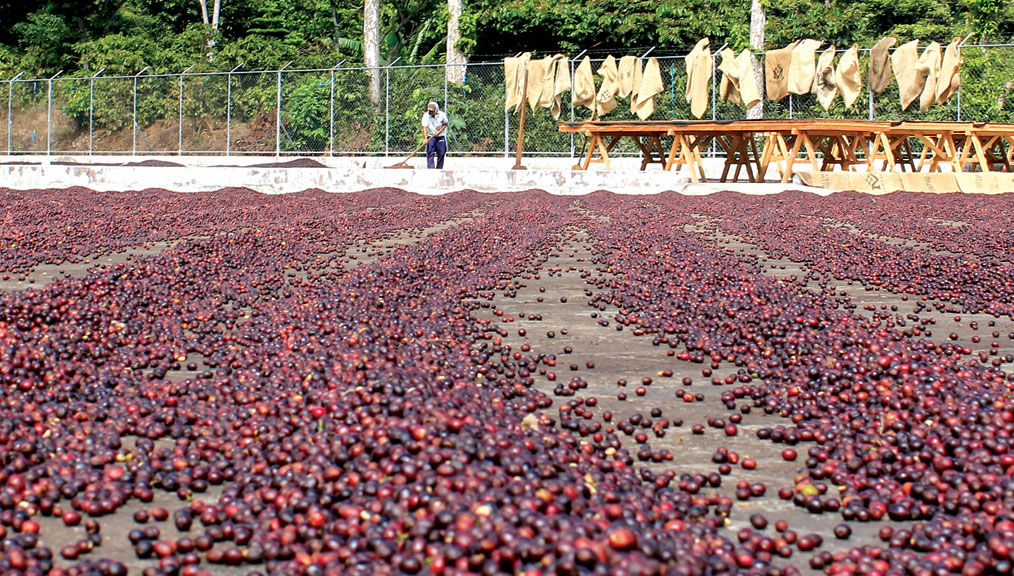(Photo: Dan Leif)
[W]ashed coffees have long been considered superior by many parts of the specialty coffee supply chain—from farmers to exporters, all the way to roasters and cafés. Often it’s much more than a mere preference for washed coffees over other processes, especially natural. It’s almost an ideological tenant that washed coffees are the only proper beans, and only their particular cleanness of cup should be what a customer experiences.
Many coffee-producing countries’ economic wellbeing is tied to their coffee trade, and governing bodies attempt to brand their countries’ coffees as high-quality, clean, and delicious, a profile relatively easy to achieve with the washed process. In the name of quality, many of these countries have placed restrictions on the export of any coffee not deemed to be “clean,” or washed. For example, in Burundi, it’s simply illegal to export naturals. They must be labeled as triage, or trash, in order to be exported. Kenya, Guatemala, and Colombia have similar regulations. There are ways around these rules, but historically the lack of an easily accessible market and the disdain for naturals keeps producers from taking risks with their nicer cherries. The result has been that most farmers reserve natural processing for their worst cherries. This, in turn, perpetuates the stereotype that all naturals taste essentially the same—dirty, fermenty, perhaps overly fruity—altogether inferior to washed coffees.
The effect of this attitude towards naturals and other alternative processing is manifold. Precious resources are expended to wash coffee, and acidic run-off leaks into ground water. Smallholding farmers are forced, by market demand, to deliver cherries to wet mills for washing instead of potentially processing some of their cherries themselves using raised beds or drying patios. If they processed their cherries themselves, it could allow farmers to maintain lot selection and keep their higher quality cherries separate from the mediocre.
Because of these benefits, many producers are beginning to apply meticulous processing methods and high-concept drying techniques to naturals. This can result in higher prices. According to an exporter from Royal Coffee New York and a Colombian producer, high-quality naturals have been selling at a dollar or more FOB (freight-on-board) than their washed counterparts in the differential.
Naturals provide baristas another tool with which to engage customers and to help explain the chain of people that brought this coffee to them.
Surprisingly, these natural process advances have all been made using equipment and techniques that are specifically designed for processing washed coffees. Most dry mills are made for washed coffees. Husking or dry milling naturals is difficult and takes special equipment or a recalibration of normal dry-milling machines. More research and experimentation with drying, moisture control, and milling equipment would push naturals forward and would continue to set high-quality naturals apart from other coffees. A refining of the natural processing method would ensure more consistency, and might convince producers to take risks with their nicest cherries.
For the roaster, high-quality naturals offer a chance to maintain lot selection and a diversity of flavor that is simply not available in washed coffees. High-quality naturals tend to contain a powerful combination of sweetness, acidity, and different, interesting flavors while maintaining cleanness in the cup. Most coffee drinkers have limited knowledge of the process that coffee must undergo in order to become a beverage. Being able to offer a customer a sweet, fruit-forward cup they can enjoy without cream and sugar, one that offers an unconventional flavor profile, is a huge step in creating an opening to explain all that coffee is, turning it from a fruit to a culinary item, from a highly traded commodity to a set of relationships. Naturals provide baristas another tool with which to engage customers and to help explain the chain of people that brought this coffee to them.
Ultimately, the discussion surrounding processing hinges on a balance between offering customers the highest quality cup while still being mindful of the effects that buying choices have on producers. It makes sense to embrace choices that offer positives to both sides. This doesn’t mean the pendulum should swing to only naturals. Certainly, high-quality washed coffees have a place in the café and in the hands of consumers.
As careful sourcing continues to grow in importance, roasters are able to know and promote the region, the farm, and the producer of their coffee, and customers are being introduced to many varying flavor profiles from the same origin. Country-based distinctions like Colombian or Guatemalan are no longer the overarching label for specialty coffees. Offering customers a diverse lineup of processing methods adds nuance to coffees that perhaps in the past presented a similar flavor profile. At our roastery, Onyx, we strive to offer coffees processed naturally, honey, and washed. It’s been particularly salient when we can offer coffees from the same region, or even the same farm, that are processed differently. The differences between these coffees are profound, and they challenge customers to think about why the coffees taste the way they do. A connection between the hard work, the art, and the luck of producing coffee and a customer is something that is only positive for the specialty industry as a whole.
Creating an industry where multiple flavor profiles and processing methods can be embraced ensures that wellbeing among the diverse makeup of producing countries continues to be cultivated while pushing customers to taste, to think, and to enjoy.
—Andrea Allen is the co-owner of Onyx Coffee Lab.







